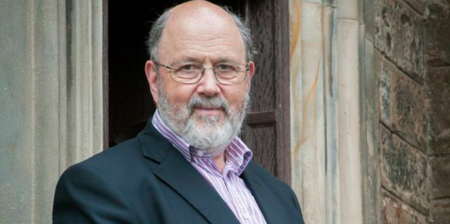We all know Wright has received a bad wrap from many conservative Christians over the years. I can remember being introduced to Wright’s view on Justification in a context in which I was told how detrimental his ideas were. Furthermore, one of the most influential figures for my theological thinking, John Piper, wrote an extensive rebuttal to N. T. Wright with The Future of Justification. Throughout the blogosphere there are many critical reviews of Wright’s work, some even calling him a heretic. From these blogs I have grown to realize why Wright called for ‘a new ethic of blogging’ at the ETS conference in Atlanta last November (cf. ‘Justification: Yesterday, Today, and Forever,’ JETS 54.1 (2011): 50). At the same conference I also sat in on Mark Seifrid’s paper (given directly after Wright’s plenary session and subsequent round-table discussion with Thomas Schreiner and Frank Thielman). It was visibly apparent that Seifrid was not at all happy with Wright as he presented his paper, which was pejoratively entitled, “The Near Word of Christ and the Distant Vision of N. T. Wright” (see JETS 54.2 [2011]: 279-298). As I reflect upon all of the back-and-forth debate between many evangelicals and N. T. Wright (ignoring for the moment other NPP scholars such as James D. G. Dunn), I am puzzled at the nature of the disagreements. Here are my two cents on the matter. I’ll provide three reasons why the aNTi-Wright polemic is unjustified.
1) Wright is conservative and should be considered a friend. He has written a massive tome on the Resurrection of Jesus, defending ardently the literal interpretation of the event as a bodily/physical resurrection (See The Resurrection of the Son of God). There is no more important issue for Christianity and Wright defends it faithfully. Similarly, he is one of the biggest names in the ‘Historical Jesus’ movement and has fought head-first against J. D. Crossan, Marcus Borg, and the rest of the infamous ‘Jesus Seminar’ folk. I also find it very refreshing that Wright is a ‘whole-Bible’ Christian who keeps the broad narrative of salvation history close at hand when interpreting Scripture (Even if the specifics may be deemed flawed at times, the methodology is thoroughly conservative). He is truly a theologian and an exegete. In Pauline studies, he has argued in full agreement with the orthodox teachings of the Church for a nascent Trinitarian theology in Paul’s writings (see What St. Paul Really Said, 63-75). Also related to Paul, he affirms the authenticity of all of the Pauline epistles. In his circles, that’s very conservative! Furthermore, he has written an entire New Testament commentary series designed to engage “everyone.” Truly he is man who loves God’s people, and this will undoubtedly be one of his most enduring contributions.
2) Although Wright disagrees with the Imputation of Christ’s perfect obedience, Wright still affirms that the basis for Justification is Christ’s finished work. Thus, since it is still something Christ does, Wright has not done something significantly different with Justification than the Reformers did (he is simply offering a more historically sensitive approach). Believers will be justified because Christ was vindicated from the dead (not because of a Medieval notion of perfection). What is true of the Messiah is therefore true of the Messiah’s people. Even Michael Bird, a Reformed Christian, suggests that Imputation cannot really be established exegetically, although he still finds theological warrant for it based upon implications of our union with Christ. Thus, he prefers to speak of an ‘incorporated righteousness’ (See The Saving Righteousness of God, 307). To my thinking, Wright’s view is thoroughly Protestant and thoroughly evangelical, despite Seifrid’s affirmation that Wright’s view is ‘not evangelical and reformational’ (“The Near Word of Christ,” 294). Seifrid argues that Wright’s view of Christians as characterized by faithfulness and by the work of the Spirit is ‘Tridentine’ and ‘Osiandrian’ (“The Near Word of Christ,” 294). The assertion that Wright’s view has more in common with Rome than the Reformed is dubious precisely because of Wright’s emphasis on the forensic nature of justification. It has nothing to do with actually being made morally upright, but everything to do with the declaration of the judge that one is ‘in the right’ (What Saint Paul Really Said, 98). Wright is merely attempting to communicate the inseparability of justification and sanctification. What’s more, his view is both rightfully Trinitarian and thoroughly Pauline (Rom 8.1-17; Gal 3.1-6; 5.5-6). Considering Seifrid’s emphasis in his talk at the 2011 ETS conference on the ‘passivity’ of faith (“The Near Word of Christ,” 280ff), I can’t imagine that he would write a very compelling treatise on sanctification.
3) Many have had trouble with the eschatological nature of Wright’s understanding of Justification. Yet, in Wright’s position, the final verdict will agree with the present verdict. Thus, for our part, we’re still justified by faith. Although there is a future judgment in which our whole life lived will be evaluated (as Wright says), there will not be a disagreement between the present and future verdict.
Now, I certainly do not agree with Wright on everything (and who does agree with anyone on everything?!), yet I have found him to be an important voice within evangelicalism. It ought to be noted that the discussion about whether Wright is a conservative or a liberal only takes place among conservatives! But if you are looking for a fair and well-reasoned critique of Wright, I highly recommend Michael Bird (see The Saving Righteousness of God; “What is There between Minneapolis and St. Andrews? A Third Way in the Piper-Wright Debate,” JETS 54.2 [2011]: 299-310; cf. also the highly anticipated Five Views on Justification). Even if you have major disagreements with Wright on the debate regarding justification, hopefully you’ll find that the broader polemic regarding him is ultimately unjustified; it is simply not (W)right.





33 Comments
Leave your reply.